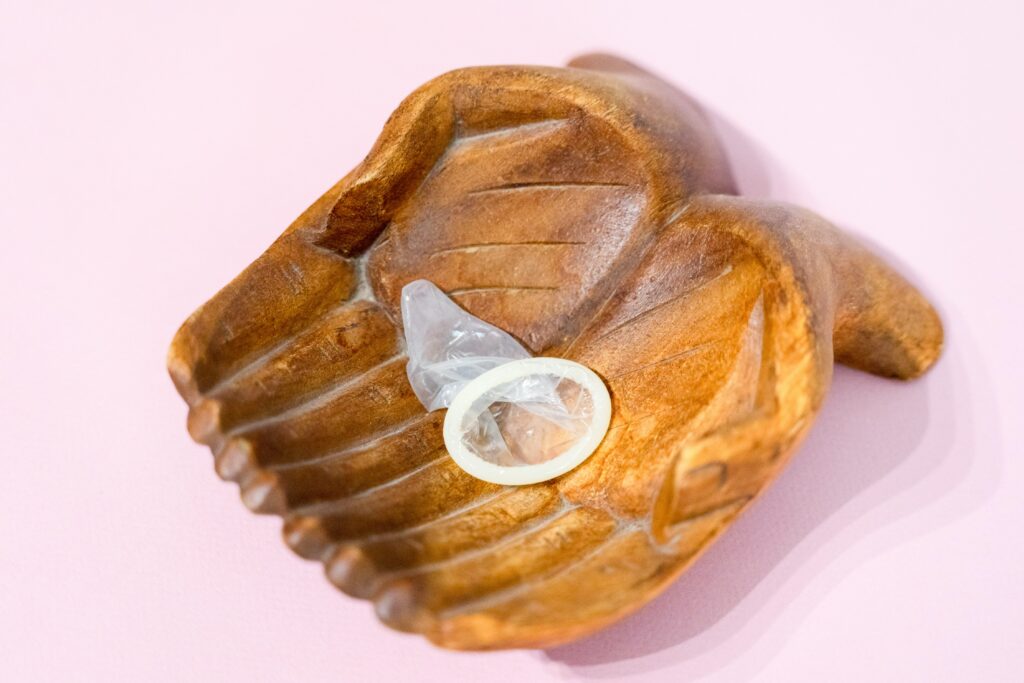It’s no secret: dating is hard.
Especially in the wake of a global pandemic. Especially when you’re navigating the ins and outs of sexual pain or painful sex.
Dating on its own is stressful enough before adding in all the other stuff to the mix, that’s for sure.
In the wake of mass vaccination and increased knowledge around pandemic best practices, the topic of dating, and addressing sexual pain while doing so, is becoming increasingly relevant once more.
As aforementioned, pelvic or sexual pain can refer to any kind of pain between the belly button and the groin. It can affect folks of any gender but disproportionately affects folks assigned female at birth (AFAB), generally cisgender women and transmasculine folks. It’s estimated that pelvic pain affects up to 15% of women in the United States in their lifetimes, and 13-32% of women worldwide. I will be discussing chronic pelvic pain (CPP), which refers to pain in the vulvarvaginal area that lasts for six months or more, or is generally unresponsive to traditional treatments.
If you’re someone that manages sexual or pelvic pain, you are not alone. It’s a tough condition to manage: people hardly talk about it, and the pain goes unseen. It can be shameful, or guilt-ridden, or awkward. It can be isolating. It can limit the things you can do, or want to try. And, it can impact your sex life, dating, and relationships in a large way.
Sexual pain can be life-changing, there’s no doubt about it. And folks who manage this pain face a different set of problems in forming relationships, dating, and having sex with new folks than people in established relationships might. That’s not to say there’s not more in common between all pelvic pain survivors — there is. But I am writing this article for the people who might have to inform a new partner, “Hey, yeah, guess what…” which is its own type of individual battle, one I’ve come to know intimately.
So: How to tell a partner how sex hurts?
This is tough.
Let’s revisit why it can be tough, and some of the barriers to having “the talk.”
I’ve been present for a million conversations about condom use in my sex education days.
“I want him to use a condom but it’s weird!”
“What if they react poorly?”
“What if we get into an argument?”
“What if it ruins the moment?”
Talking about sexual pain can feel like “the condom talk” on steroids. Whereas most folks have learned about protective methods for sex (hopefully?), not as many have heard about chronically painful sex, or know best practices for managing sexual pain. So having the talk might feel akin to imparting a burden of yours onto a partner. Facing the prospect of having to bring up an uncomfortable subject and having to educate a partner can be daunting. Needing to be vulnerable in a new situation with someone you might not know so well is nerve-wracking.

People, and folks raised as women especially, face cultural expectations of taking up as little space as possible, not being burdensome, and putting a potential partner’s pleasure and needs first. It’s normal to want to avoid awkwardness, or put your own needs at the bottom of the pile. That said, my message of empowerment is that this is not necessary.
It’s revolutionary but: It’s possible to have sex with someone who sees you as a full and complete person.
I get it: hooking up is awesome and maybe anonymous sex is less stressful than rubbing souls with a fellow human. Check and check. That said, it’s possible that your desire in seeking sexual pleasure or fulfillment does not involve you existing simply as a human fleshlight at the end of someone’s member. It’s OK for you to be present during sex. It’s OK for you to have needs, or to have care taken of you.
Not saying this is the way it has to or should be, I am just raising the possibility, here.
Abandoning your own comfort and well-being at the cost of “avoiding awkwardness” or “not burdening your partner” can be taxing, stressful, and just plain unpleasurable.
So what can be done about it?
The Talk — preemptively discussing concerns.
Communicating through sex — also an option.
If you’re at all like me, and can manage discussing the taboo, it might be beneficial to have a conversation about sex, before sex. Revolutionary, I know.
Discussing sex with someone new to you is tough, because we’re working on establishing the rules, here. Getting to know each other, and the ins and outs of what makes our sexual clocks tick. That said, discussing sex can be as intimate and exciting as having sex. With the added bonus of potentially decreasing stress around when it becomes time to rub bits as well as heightening the chance of pleasure happening, since we know what we’re working with.
Bringing up the ol’ S-E-X can be daunting, but also a valuable method of assessment for compatibility: Is it important to you that a partner can communicate about tough or taboo subjects? Can you gain information from the way that you communicate about sex that can help you to determine whether this is someone you’d like to fuck/date/sleep beside/get dinner with? Can talking about sex help you to feel safer in a casual or unfamiliar environment?
There’s a few ways to handle this: you can cannonball in, you can dip your toes in at the ladder, or you can check out the surroundings to see what’s going on before even beginning to submerge. That said, we are getting in the water whether you like it or not. So prepare for goosebumps and a weird pain behind your bellybutton that feels like torture until we get used to this water’s temp.
Talking about sex before sex does not remove the “magic” of sex. It does not reflect poorly on you, or make you seem too eager. It’s just something that folks can do to feel comfortable and share information about something important. It gets easier with practice. Pinky promise.

A well-placed (and here, well-placed meaning, placed at all) “Hey, you know what’s weird?” can certainly break the ice. Maybe you slide it into a discussion of past relationships. Maybe it comes up when discussing schedules, work, hobbies, and activities, which can include doctor’s visits. Or maybe it happens during one of those fun, increasingly-present-in-my-old-ass-life conversations of “My Body’s Various Aches And Pains ™.” Whatever the case, it’s OK to discuss sexual pain. Do you want a person to touch you? It’s OK that they know how.
Making jokes is alright to lighten the load. “Guess what, I go to physical therapy and get fingered,” is certainly a conversation that’s possible, depending on your sense of humor. And it’s OK to laugh about — bodies are weird. Check your language to ensure you aren’t the butt of the joke, if possible. Sexual pain is hard. You don’t need to self-deprecate about it. It’s already hard enough.
It’s OK to go into as much depth as you need.
“Yeah, it just hurts sometimes with deeper penetration. I’ll tell you when.” “Yo, it’s this muscle, the obturator internus, what a motherfucker.” “I can’t deal with stimulation all around the vestibule — oh, the opening, I mean. It’s pretty intense.” “Having sex is really hard for me, even though I’ve been working on this for a while. I prefer to do other things.”
All valid.
Pleasure and comfort are valid for all folks involved in sex. In the same way you would prefer that your partner tell you that they don’t like being referred to by their full first name and prefer a nickname instead, it is also likely that they would prefer to know what kinds of touch are on- and off-limits for you.
Sharing information about sexual limits and your own boundaries is important for you and another person to grow alongside each other, together in the same direction. Even if you’re just looking for a casual connection.
Say you’re like, “Sara, this would have been nice to know a month ago, but now I’m seeing someone and haven’t told them before having sex.”
Alright, cool. No problem. We got this. How do we talk about sexual pain during sex?
Again, I understand the big barrier here might be, I don’t want to ruin the moment. I might argue, Well, it sounds like the moment might already be just a little ruined if it hurts and you are not enjoying it. You are important for “the moment” (or all of them, really) to be right or not. You are a part of this sexual tapestry.
Speaking up during sex can feel like paddling upstream. So let’s get these arms ripped.

If something is feeling off, it’s ok to note it. “Whew, that feels a little painful. Can we do XYZ instead?” “Whoa! That hurts some. Can you move over there?” “Ah, this is a bit much for me. Can I do this instead?” “Can you touch me here?” “I don’t know if that’s on the table for me today, but I’m down for XYZ.”
Stopping things entirely might feel like too much, or might feel like you’re under a BURNING HOT SPOTLIGHT. OK! Makes sense. Making suggestions is OK, and also helps your partner to know what to do with themselves. It’s likely they are there to give you pleasure. Showing them how is A+ acceptable.
“Hey, this feels a little rough, can we use lube?” “Ah, I’d really like this better if we slowed this down some.” “I’m feeling a little tight today, can we go back to doing oral?” “I’d really rather kiss and caress you right now.”
Understandably so, sexual interaction can play a large role in establishing a connection or relationship with someone new. Talking about sexual ins and outs (yup) earlier on can be useful to cultivate the kind of relationship you’d like to have with someone new — supportive, caring, empathetic, whatever. Your new relationship is malleable and moldable, and you have control in this. Defining your relationship on your terms is a good thing, and makes it more likely you will find what you are looking for — or create it yourself, along the way.
Disclosing this sort of information, and communicating about sex, may also open you up to seeing certain red flags in a relationship early on.
Red Flags include if a partner or potential partner:
- Pressures you into sexual activity
- Hears your concerns but ignores or disregards you
- Intentionally does things that are painful or damaging
- Makes damaging or hurtful jokes about you or your pain
- Guilts or shames you
- Makes your sexual stories or needs about them
- Changes the subject or directs a conversation away from what you’d like to discuss
Needless to say, it’s not a guarantee that someone will react well, or take kindly to conversations about “real life” sex. We exist in a largely sex-negative culture. There’s gonna be some folks that don’t handle stuff well. It’s OK. This all is a learning experience. That’s why we’re dating, right? We are working on finding someone (or ones!) who are a good fit for us, literally and metaphorically.
To be less pessimistic over here, let me say, sharing stories and experiences of sexual pain can actually serve to make you closer to a partner. I have experienced and heard of many positive reactions and affirming conversations had after disclosing sexual pain to a partner.
Green Flags include if a partner or potential partner:
- Asks follow-up questions
- Expresses that they do not wish for you to experience pain
- Actively listens to your needs and concerns
- Respects and recognizes your boundaries
- Affirms and respects your communication around sex
There’s always more to say on this subject, but I’ll leave it at this for now: You are valid. It is OK to have boundaries. It is OK to talk about sex. It is OK to feel all sorts of feelings about sex. It is OK to be a work in progress.
One Reply to “Communicating about sexual pain when dating”
Comments are closed.